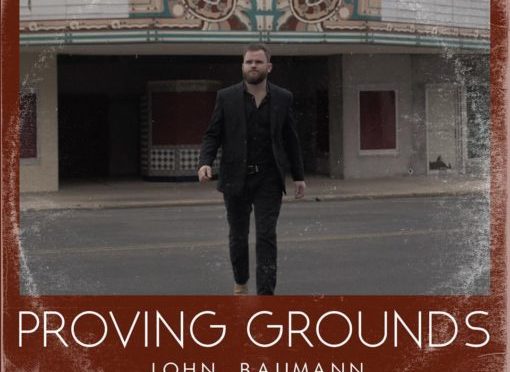Rating: 8.5/10
Texas country and Red dirt, despite all of the many influences and sounds, still really comes down to two sides, just like its Nashville counterpart–there’s more of an equal playing field in Texas and Oklahoma, and that’s ultimately the difference, but the point is, you still have your serious, singer-songwriter types and your more pragmatic, commercial types. The former would be the Jason Eadys and Courtney Pattons and Jamie Lin Wilsons, and the latter would be the Aaron Watsons and Josh Abbotts, and the beauty of it all is that each artist gets to choose their own path. And then sometimes, you get artists like Turnpike Troubadours; I remember Jamie Lin Wilson telling me they could play in listening rooms or big venues because Evan Felker writes deep songs “that also make you want to party.” And it would seem that John Baumann has managed to capture that spirit as well on his latest album, Proving Grounds, effortlessly blending the serious and the fun, the bright and the dark, into a really enjoyable album, an album that I think will have quite a lot of mileage throughout the year.
John Baumann has said that this is his most personal record, and you can feel that echoing throughout the album, from the stirring opener, “Here I Come,” to the nostalgic closer, “Pontiacs,” which goes on for over eight minutes. The opener details Baumann’s dreams as a child to one day become a successful singer-songwriter and reflects on his life now as he gets closer to being a “high plains troubadour.” I think “High Plains Troubadour” would have been a great name for this record. The closer, as I mentioned, is nostalgic and sees John Baumann as an adult, wishing for just one more day to be young. Admittedly, this is not one of my personal favorite tracks, but it does serve as a closing thought to the journey started in “Here I Come,” and together, the two frame the album nicely. In between, we learn, in sharp detail, the pain of Baumann’s father dying in “Old Stone Church,” and how each family member coped in their own way. With its simple melody and honest, glaringly specific lyrics, this one stands out proudly on the album and will relate to anyone who has been through the pain of losing a loved one despite it being so personal to Baumann.
In less autobiographical, but no less serious, moments, there’s the beautiful love song “Turquoise” and the thoughtful “Lonely in Bars”–I’d like to take a moment to point out that the former takes place entirely by a river in the moonlight, and that the latter is about two people meeting in a bar and the offer for more, and yet neither of these songs manage to be clichéd, disrespectful, generic, etc. IN “Turquoise,” the only parts of the woman we ever hear about are her “turquoise eyes” and it never goes further than “the first kiss I plan to give her.” In the latter, the story line goes far deeper than just meeting at a bar and hooking up; you hear the details about the woman not having a ring and having been in a troubled relationship with an older man, and you hear the narrator making the offer to stop being lonely in bars and see what happens, “embarrassment be damned.” Either of these, especially “Lonely in Bars,” could legitimately be mainstream hits, or they could have been, if they were less well-written or respectful. Essentially, they started with moonlit rivers and midnight bars, the foundations for mainstream hits, and then actually progressed into great songs.
Mixed in with all these great songs, we get the fun side of John Baumann. “The Trouble with Drinkin'” has got to be one of the catchiest songs I’ve heard this year; that fiddle is awesome, and it would be great live. There’s another one dealing with addiction in “Heavy Head,” and the beauty in “Turquoise” is followed by the more lighthearted “Love #1” which could be seen as the continuation to that song. Texas songwriters are often criticized–and many times rightfully so–for their continuous references to Texas, but “Holding it Down” manages to be clever, witty, and catchy despite this. There are so many artists that could take a lesson from this–you can make a song about Texas in a smart way. “When Ophelia Comes to Town,” with its lively, rocking production, is one of my personal favorites here, and one of the most fun; it details all the things the narrator does to get ready for a woman to visit, and all the things they’ll do once she arrives. I wasn’t expecting the twist at the end, and I almost wish it had stayed fun because in the end, he gets word that “Miss Ophelia’s dead.” But the song’s still fun, and it’s still one of the standouts for me.
So, if you haven’t figured it out, this is a great album. It’s got some excellent songwriting, and it’s a good balance between the serious and fun songs. Hopefully, John Baumann continues in this direction, writing more personal stuff, because this is where his writing shines, and I think it will only get better. This is one of the best Texas country albums released in 2017 so far and one that gets better with each listen.
